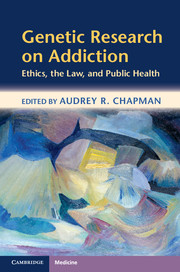Book contents
- Frontmatter
- Contents
- Contributors
- Preface
- Section 1 Introduction
- Section 2 Research ethics
- 4 Improving the informed consent process in research with substance-abusing participants
- 5 Ethical considerations in genetic research with children affected by parental substance abuse
- 6 Protecting privacy in genetic research on alcohol dependence and other addictions
- 7 Certificates of Confidentiality: Uses and limitations as protection for genetic research on addiction
- 8 Ethical issues in human genomic databases in addiction research
- 9 Should addiction researchers accept funding derived from the profits of addictive consumptions?
- 10 Ethical issues related to receiving research funding from the alcohol industry and other commercial interests
- Section 3 Translating addiction research
- Section 4 Conclusions
- Index
- References
7 - Certificates of Confidentiality: Uses and limitations as protection for genetic research on addiction
from Section 2 - Research ethics
Published online by Cambridge University Press: 05 September 2012
- Frontmatter
- Contents
- Contributors
- Preface
- Section 1 Introduction
- Section 2 Research ethics
- 4 Improving the informed consent process in research with substance-abusing participants
- 5 Ethical considerations in genetic research with children affected by parental substance abuse
- 6 Protecting privacy in genetic research on alcohol dependence and other addictions
- 7 Certificates of Confidentiality: Uses and limitations as protection for genetic research on addiction
- 8 Ethical issues in human genomic databases in addiction research
- 9 Should addiction researchers accept funding derived from the profits of addictive consumptions?
- 10 Ethical issues related to receiving research funding from the alcohol industry and other commercial interests
- Section 3 Translating addiction research
- Section 4 Conclusions
- Index
- References
Summary
Introduction
Certificates of Confidentiality have existed to protect research data for over 40 years, yet they are rarely used (Cooper et al., 2004: 217). Relatively few researchers seek and obtain certificates, even in fields such as genetics where most researchers acknowledge collecting sensitive data. As Professor Mark Rothstein points out in his chapter on protecting privacy in this field of research (Chapter 6 of this volume), “[g]enome researchers often analyze and manipulate vast data sets derived from the 3.2 billion base-pair human genome” and involving the genetic material of thousands of individuals. These very large data sets often include extensive phenotypic data on individuals, including their identities and medical, behavioral, and social histories. In research focusing on alcohol and drug dependence, data collected may include evidence of illegal activities, as well as risky activity, dependence, or addiction. Any such evidence, if disclosed, could have serious negative consequences on participants’ employment and education opportunities and on their relationships within families and communities. Such databases could also provide tempting targets for law enforcement under a number of different scenarios (Earley and Strong, 1995: 728), from officials seeking information on possible child abuse or domestic violence (Marshall et al., 2003) to requests to search the database for a match to evidence left at a crime scene or on a victim.
This chapter will focus on Certificates of Confidentiality as one tool to protect the privacy and confidentiality of research data, particularly from the types of third-party requests arising from the legal system (subpoenas and court orders). First, it will review the history of Certificates of Confidentiality. Second, it will consider arguments for their use, particularly in genetic research on addiction. Third, it will review critiques of Certificates of Confidentiality, including whether they are necessary, whether they are effective, and whether they can be relied on to protect subjects’ sensitive information.
- Type
- Chapter
- Information
- Genetic Research on AddictionEthics, the Law, and Public Health, pp. 97 - 107Publisher: Cambridge University PressPrint publication year: 2012

